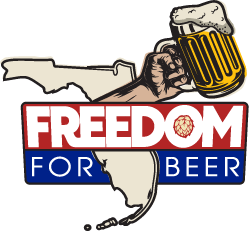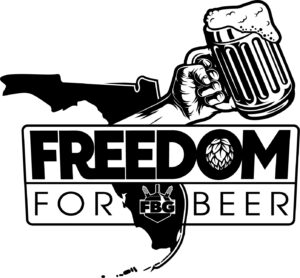Issues & Solutions
Self-Distribution
Problem
Self-distribution, while currently prohibited in Florida; is permitted in 38 other states. Florida is in the minority for adopting this important provision for the benefit of craft breweries. Most established beer distributors focus solely on efficiency and predictability with those beer brands with which they are most familiar. Unfortunately, startups and smaller brewing operations pose a challenge to these distributors because they don’t fall within those parameters.
The distributors make a profit for their part in getting the beer from the manufacturer to the retailer, i.e. package stores, restaurants, and bars. This results in an additional markup and a higher end price for the consumer. It also limits the competitiveness of smaller breweries against larger brands who can capitalize on lower production costs based on volume.
Additionally, signing with a distributor is a lifetime contract protected by Florida law (see Florida Franchise Law) eliminating any real possibility for a change in distribution and making the decision in selecting a distributor paramount to the success of a brewery. It bears repeating that no other industry, including wine and spirits in Florida are subject to a lifetime contract *protected by law* for their business.
Allow breweries to self-distribute their beer until their brand reaches a certain volume level or they determine it is in their best interest to work with a distributor. This will give the brewery a fair chance to build their sales and demand for their product in the marketplace. By going directly to the retailer, it also allows a small brewery to capture some additional profit to help build their brand and company, while remaining competitive in price against other brands.
Solution
Franchise Law
Problem
Breweries are the only alcoholic beverage product, and indeed, the only industry, that has contractual restrictions on the distribution and sale of their products. No such franchise statutes protect the distribution contracts of spirits, hard cider, and wine. Florida statutes not only govern but overrule any type of negotiation in the contractual process between a distributor and the brewery. Violations of the contract by a distributor cannot force or permit termination “without cause,” because the distributor is protected by specific statutes written in their favor(See Section 563.022, Florida Statutes).
Additionally, these franchise laws continue the distribution contract in perpetuity, meaning if the ownership changes on either side of the business, (brewery or distributor) the existing contract automatically transfers and no renegotiations are permitted between the parties.
By way of example, when AB was merged with InBev and became ABInBev, the distribution rights remained with the distributor of those products; the breweries had no rights to consider whether this was good for their businesses or not. Conversely, when Brown Distributing recently sold their brand portfolio to other distributorships, the breweries had no choice but to go with the subsequent purchaser, rather than selecting a new distributor that was the best fit for their brands. Franchise laws were written solely to protect distributors from losing brands that constituted the bulk of their business, but it provides no ability for choice for the brewery that brews the beer being sold.
Franchise laws should be limited to manufacturers of certain sizes either by total volume or by a percentage of the business they represent to the distributor. Franchise law restrictions should be based on production capacity rather than across the board regardless of the size of the brewery. These changes would continue to protect distributors from losing large manufacturers that comprise the majority of their sales and affect the stability of their business, while allowing smaller breweries to negotiate their contracts based on their specific needs for the benefit of both parties.
Solution
Licensing Fees
Problem
Licensing fees are not determined by the production size of the brewery but rather a flat rate amount for every sized manufacturing brewery, a “one-size-fits-all” approach. This means large multinational breweries pay the same licensing fee as the small brewery right down the street in your neighborhood.
Licensing fees should be determined on a sliding scale based on the amount of production. Breweries already pay state taxes on every beer manufactured and sold across the bar in their establishment, along with brand registration fees, federal taxes on every barrel produced, and additional local taxes and fees and yet pay the same licensing fee as giant production breweries producing millions of barrels of beer per year. This one-size-fits-all approach is simply untenable for Florida’s smaller breweries. Or to put it another way, consider this fee to be amortized over the cost of every barrel of beer sold by a brewery. For a large brewery, this is inconsequential, resulting in pennies or less per barrel, but for a small brewery, this results in an unequal financial burden for every barrel sold.
Solution
Here's What You Can Do!
With Your Help We Can Make Change
& “Free the Brew” in Florida
STAY INFORMED
Join Our Email List and We’ll Keep You in the Know.


